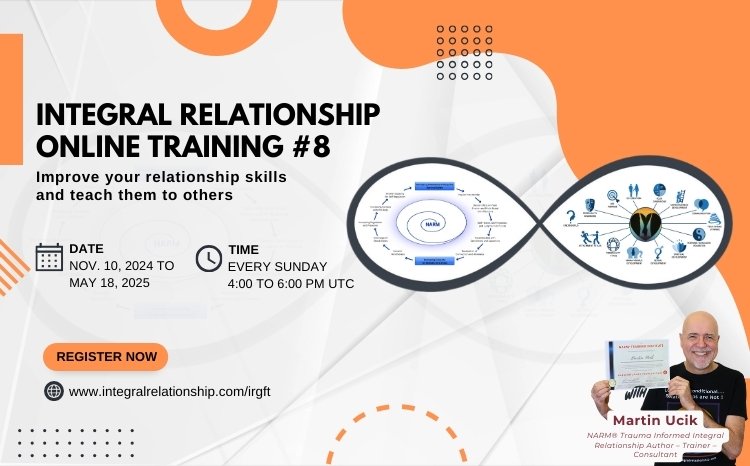Integral Relationship Training #8 Modules
Join individual Modules for a $30 donation
Click on each of the event images below that you want to register for

Nov. 10. 2024, Module 1: The four dimensions of relating
Register to learn and practice building a solid foundation for a healthy, sustainable, Integral Love Relationship. Realize that four essential dimensions of your human being and relating come into intimate contact when you fall in love and enter a committed romantic...

Nov. 17. 2024, Module 2: Survival, magic, and power in love relationships
Register to learn and explore how the archaic, magic, and egocentric stages of consciousness developed in your earlier life and how they impact your love relationships today. Receive an introduction to cultural and individual developmental stages of consciousness and...

Nov. 24. 2024, Module 3: Mythic conformism and modern rationality in love relationships
Register to learn and practice how/if the mythic and modern stages of consciousness developed in your life, and how they impact your love relationships today. Gain insights into the fourth stage, which is called mythic or traditional, in which you seek to satisfy your...

Dec. 1. 2024, Module 4: Postmodern pluralistic sensitivity in love relationships
Register to learn and practice how/if the pluralistic stage of consciousness developed in your life, and how it impacts your love relationships today. Feel how this stage allows for greater compassion, idealism, and involvement by providing a sense that all human...

Dec. 8. 2024, Module 5: Integral and transpersonal love relationships
Register to learn and practice how/if the integral and transpersonal stages of consciousness development emerged in your life, and how they impact your love relationships today. Realize why people at the previous “first-tier” levels of consciousness development...

Dec. 15. 2024, Module 6: Compassionate communication
Register to learn and practice how to communicate your observations and related feelings in a nonviolent and compassionate way in order to get your needs met by your partner. Identify your specific needs when relating with others, especially in your love...

Jan. 5. 2025, Module 7: Need-Based communication
Register to learn and practice how people at the first six levels of consciousness development communicate differently to validate their views and behaviors to get their needs met. Realize that it is generally true that the most important skill to make relationships...

Jan. 12. 2025, Module 8: Integral and transpersonal communication
Register to learn and practice how people at the seventh integral and eighth transpersonal level of consciousness communicate to validate their views and behaviors in order to get their needs met. Realize why everyone is right (but not equally right) from the...

Jan. 19. 2025, Module 9: Biological Differences and Learned Gender Roles
Register to learn and practice how to understand the opposite sex as never before, by hearing about their deepest secrets, truths, fears, shame, frustrations, desires, hopes, attractions, joys, appreciations, and needs. Distinguish between biological/natural sex...

Jan. 26. 2025, Module 10: Avoiding the Fear – Shame Downward Spiral
Register to learn and practice how to avoid going down the fear-shame spiral that eventually leads to relationship crash, and how to make amends and return to love if the spiral has already happened for you and your partner. Realize why approx. 50 percent of...
Support Integral Relationship
Do you appreciate Martin’s work and want to make a financial contribution? Any amount, small or large will support him and his team to produce more inspiring and helpful content and make the world a better place. Thank you very much!
